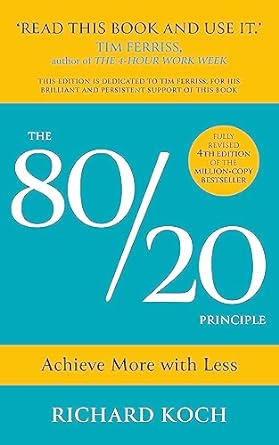Be more effective with less effort by learning how to identify and leverage the 80/20 principle: that 80 percent of all our results in business and in life stem from a mere 20 percent of our efforts.
The 80/20 principle is one of the great secrets of highly effective people and organizations.
Did you know, for example, that 20 percent of customers account for 80 percent of revenues? That 20 percent of our time accounts for 80 percent of the work we accomplish? The 80/20 Principle shows how we can achieve much more with much less effort, time, and resources, simply by identifying and focusing our efforts on the 20 percent that really counts. Although the 80/20 principle has long influenced today's business world, author Richard Koch reveals how the principle works and shows how we can use it in a systematic and practical way to vastly increase our effectiveness, and improve our careers and our companies.
The unspoken corollary to the 80/20 principle is that little of what we spend our time on actually counts. But by concentrating on those things that do, we can unlock the enormous potential of the magic 20 percent, and transform our effectiveness in our jobs, our careers, our businesses, and our lives.

George Bernard Shaw put it well. "The reasonable man adapts himself to the world. The unreasonable man persists in trying to adapt the world to himself. Therefore all progress depends on the unreasonable man."
A good exercise is to work out the most unconventional or eccentric ways in which you could spend your time: how far you could deviate from the norm without being thrown out of your world. Not all eccentric ways of spending time will multiply your effectiveness, but some or at least one of them could. Draw up several scenarios and adopt the one that allows you the most time on high-value activities that you enjoy. Who among your acquaintances is both effective and eccentric? Find out how they spend their time and how it deviates from the norm. You may want to copy some of the things they do and don't do.
Think about your past achievements that have had the most positive "market" response from others, those that have led to the greatest critical acclaim. What methods worked best for you in the past Which collaborators? Which audience? Looking forward, what could you achieve that would make you proud, that no one else could do with ease?
10 Golden Rules for Career Success:
1. Specialize in a very small niche; develop a core skill
2. Choose a niche that you enjoy, where you can excel and have a chance of becoming an acknowledged leader.
3. Realize that knowledge is power.
4. Identify your market and core customers and serve them best.
5. Identify where 20 percent of effort gives 80 percent of return.
6. Learn from the best.
7. Become self-employed early in your career.
8. Employ as many net value creators as possible.
9. Use outside contracts for everything but your core skill.
10. Exploit capital leverage.
Two Ways To Be Happier:
1. Identify the times when you are happiest and expand them as much as possible.
2. Identify the times when you are least happy and reduce them as much as possible.
The best way to start being more happy is to stop being unhappy. You have more control over this than you imagine. by simply avoiding situations where experience suggests you are likely to become unhappy. For activities that are very ineffective at making you happy, think systematically about ways you could enjoy them more. If this works, fine. If it doesn't, figure out how to avoid these situations.
Daily Happiness Habbits:
1. Exercise
2. Mental stimulation
3. Spiritual/artistic stimulation/meditation
4. Doing a good turn
5. Taking a pleasure break with a friend
6. Giving yourself a treat
7. Congratulating yourself

Leave a Reply